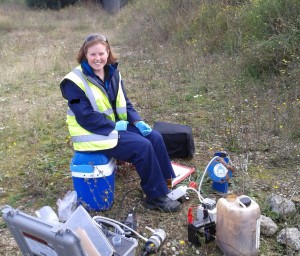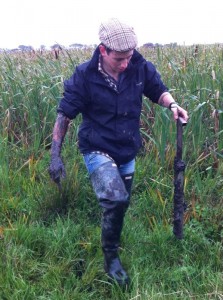Name: Leigh Garside
Occupation: Assistant Consultant-Contaminated Sites
Title of Master’s program: Environmental Biogeochemistry
Year of completion: 2011
Dissertation title and supervisor name: Trace metal controls on methane cycling in Golfo Dulce, Costa Rica: An anoxic tropical marine basin – Simon Poulton and Helen Talbot
1) The Twitter challenge: What are you doing now in 140 characters
I currently work in a contaminated sites team undertaking desk studies, data reviews, site investigations and subsequent monitoring rounds.
2) Tell us a little more about your career.
I work as a contaminated sites consultant, investigating historical pollution on sites around the UK. To assess contamination we use the source-pathway-receptor concept to create a Conceptual Site Model (CSM) which helps us understand whether contaminants at a site are actually posing a risk to groundwater or human health. The actual day to day job I do, involves desk studies, data reviews, letter and formal reports, site investigations including groundwater monitoring well installation, permeability testing, soil and air vapour monitoring and groundwater and soil sampling.
3) How did the MSc help you get this job (e.g. skills etc)?
My MSc was essential for getting this job, in particular, the analytical chemistry helps me understand how my samples are analysed by our laboratory subcontractors, and the source and fate of pollutants and hydrogeology aspects are valuable for developing CSMs.
4) What did you enjoy most about your masters?
I enjoyed the small class sizes, the contact time with lecturers and most importantly the lab time. It’s a great asset to understand the lab techniques and potential errors, and to be able to factor them into my work now.
5) What was the most challenging aspect of the masters?
A masters is hard work, it can be academically challenging and the volume of work can be difficult as you are learning new concepts all the time. It was definitely worth it though.
6) Words of wisdom to future Newcastle University students
Make sure you join some of the clubs to get out of the department-you don’t want to spend your life in the Drummond computer room!


